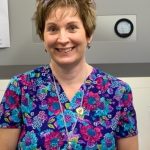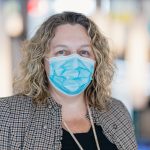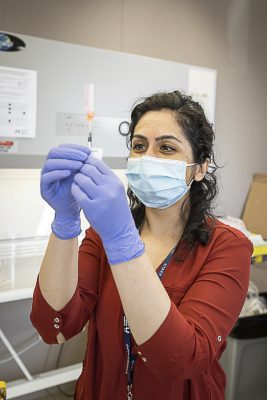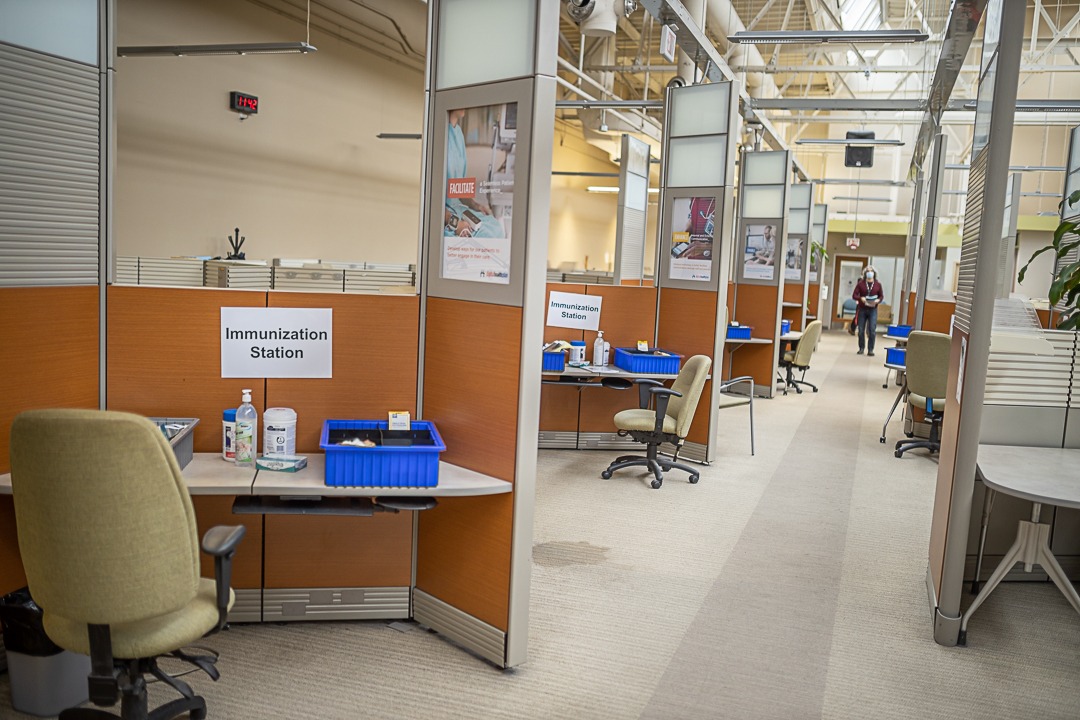
From freezer to arm: HHS pharmacy team part of history in the making
On December 23, the first doses of the Pfizer-BioNTech vaccine were administered in the Hamilton Health Sciences fixed vaccine clinic. On that day and every day since, pharmacists and pharmacy technicians have been key members of the clinic team. For the community at large, the clinic provides hope for the end of the COVID-19 pandemic, more than one year later.
“Working that first day in the only vaccination clinic in Hamilton was a proud moment for me. It was history in the making,” says Kelly-Ann Wakeford, a pharmacy technician in the clinic. “We celebrated that first vial we made as we knew it was one step closer to beating this virus and clapped when that first needle went into an arm!”
Complex responsibilities
Pharmacy technicians are responsible for mixing the drug to make the vaccine in batches, while pharmacists oversee the vaccine preparation process and keep track of the inventory and movement of the vaccine throughout the day.
It’s a complex process for pharmacists like Rida Batool, who have to ensure the team is producing just enough vaccine for the scheduled appointments that day, but also ensure there are no extras so not a single dose gets wasted.
Vaccines only last five days once they are thawed, and only six hours once they are mixed, so timing must be precise.
How it’s made
When vials of the vaccine arrive at the clinic, they go straight into a special, -70 degree freezer until the pharmacy team is ready to defrost them. Vials come in a tray. They can’t be carried so they must be rolled on a cart.
“The molecules in this vaccine are very sensitive,” says Sue-Anne McAlpine, manager of pharmacy services.
Based on the order size, the pharmacy team takes the vials out of the storage freezer and puts them into a fridge where they defrost, typically overnight.
Each morning, the team retrieves the vials from the fridge to prepare the syringes. The vaccine requires “reconstituting” which means it needs a diluent to bring it up to full volume. The team puts a saline additive into the vial.
There are multiple doses in one vial. Six doses is the minimum, but sometimes the team is able to get seven – a bonus.
“The first time we were able to get a seventh dose out of the vial was a big moment for us. We all cheered in the pharmacy area.” says Batool. “It’s very tricky to get that last little bit out of the vial, but our technicians are so good at what they do. Now, every so often we’re able to get a seventh dose.”
Timing is everything
Once the drug is reconstituted and drawn into a syringe, it has to be used within six hours. That means team members take appropriate drug supplies out of the fridge multiple times per shift and reconstitute them.
At the end of the day, they need to have exactly the right number of doses.
“After about 4:00 p.m., we are very careful with how many syringes we are preparing so we start making smaller batches,” says Batool. “I do counts with how many are still on the floor and compare that to the number of people who still have to come to the clinic.”
Making a difference
The pharmacy team arrives at the clinic at 6:00 a.m. daily to prepare vaccines for 8:00 a.m. appointments. Then when the vaccinators arrive, they are given their first batch of doses for the day and a log sheet to sign.
Each morning the team arrives at the clinic, they know their work is making a difference.
“The vaccine is the light at the end of the tunnel. It’s the thing that’s going to get us back to normal,” says Batool. “I’m so grateful to be able to contribute even a little bit to the distribution of the vaccine to people in Hamilton.”




